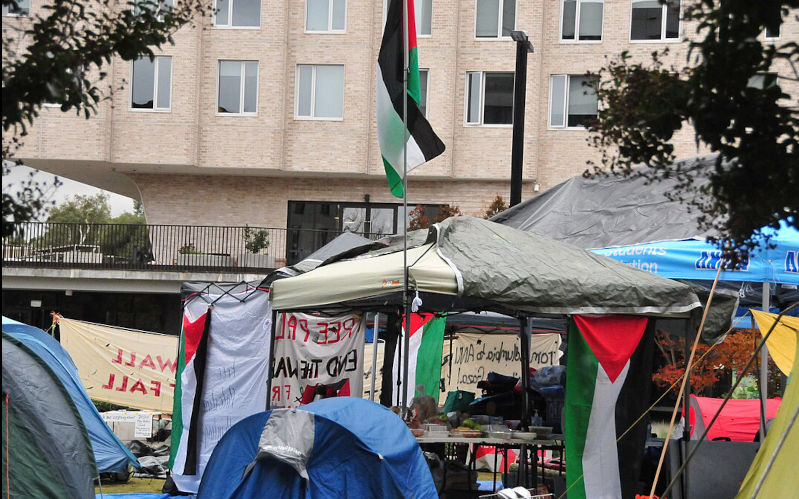It’s once you’re dead or out of the picture, unable to meaningfully contest the narrative, that institutions can appropriate the very struggles of those who once fought against them. This sort of co-option of movements is a consequence of how memory works in society.
Writings from the ANU Gaza Solidarity Encampment – Part 5
This is Part Five of a six-part series of articles from the ANU Gaza Solidarity Encampment. Apart from the Introduction by Emeritus Professor Tamara Jacka, all articles are written by student members of the encampment. To protect the authors against identification, we have kept them anonymous.
The most important lesson from the ANU
In one building in the Australian National University (ANU), there is an exhibit on the history of protest at the university dating back to the university’s founding detailing various waves of protest over the decades. This, of course, downplays the level of acrimony between the movements trying to force change and the university.
That isn’t that surprising. Attempted recuperation of radical moments and figures is a constant. A particularly stark example might be the FBI publicly honouring the legacy of Martin Luther King despite having not just surveilled him, but also sent him a letter encouraging his suicide. It’s once you’re dead or out of the picture, unable to meaningfully contest the narrative, that institutions can appropriate the very struggles of those who once fought against them.
This sort of co-option of movements is a consequence of how memory works in society. Established institutions require a baseline of legitimacy to function. And so as culture changes they’ll happily shift the way they present themselves to the public. Sure among those in the know these moves are deeply cynical. But the broader populace that is largely indifferent, they won’t do the work of looking deeper and so these rebrands can sorta work.
So regardless of how this movement plays out, we’re going to see a shameless attempt to bury the Zionist associations of the ANU and universities worldwide more broadly. Call me cynical, but I don’t think that the university will be openly advertising their association with genocide on the material they promote. Maybe we’ll get some statues or plaques to commemorate the slaughter that conveniently overlook the role the university played.
If I sound cynical, well it’s because I am. But I have come away from all this with some optimism about the future, not because of the actions of the university, but rather of the activists. For a great many participants this is their first experience with organising. And overwhelmingly the experience has been life-changing.
In no small part because this protest gave people what they were looking for when they went to the ANU. A constant narrative from many involved in the camp is that they entered university bright-eyed with hopes of meeting like-minded people and working toward something that changed the world for the better. What they got instead was social alienation and career paths that would either reinforce a destructive status quo or mildly alleviate it. It’s only with taking part in this encampment that they found something different, a community of people working towards seriously changing the world through non-standard means together.
So, ironically, it is only through the failure of the ANU to live up to its stated commitments that some students there have gotten the experience that they originally came to university for.
For more on this topic, P&I recommends:
Succumbing to the Zionist Lobby: higher education institutions abandon ethics and integrity
